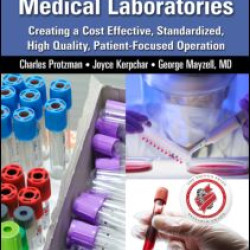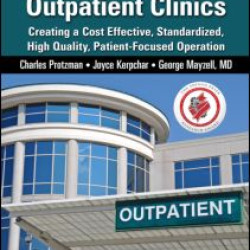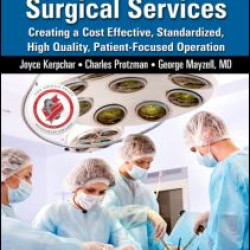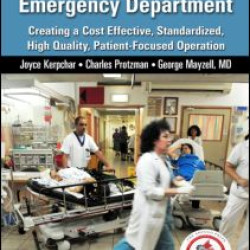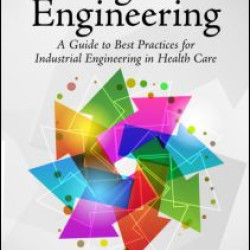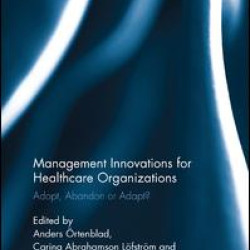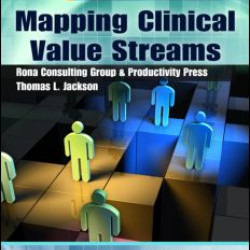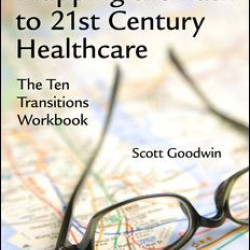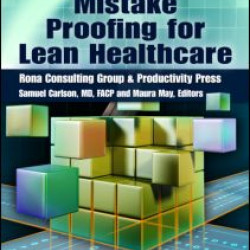Healthcare Management
Brand: Taylor & Francis
Model: Stock
Lean principles can help medical laboratories drive up efficiencies and quality without increasing costs or compromising quality. This book provides a functional understanding of Lean laboratory processes and quality improvement techniques. The first section provides an overview of Lean concepts, to..
₹3,818.14 ₹4,772.68
Brand: Taylor & Francis
Model: Stock
Because ambulatory care settings play a significant role in the healthcare delivery system, it is important to understand how Lean concepts and tools can be used to deliver high-quality, cost-effective care. This book provides a functional understanding of Lean processes and quality improvement tech..
₹3,818.14 ₹4,772.68
Brand: Taylor & Francis
Model: Stock
This book provides a functional understanding of Lean processes and quality improvement techniques for surgical services. The first section provides an overview of Lean concepts, tools, methodologies, and applications. The second section focuses on the application of Lean in the surgery suite. Prese..
₹3,818.14 ₹4,772.68
Brand: Taylor & Francis
Model: Stock
Emergency departments have become the new primary access point into the healthcare system for many. As a result, emergency departments have become notorious for their long wait times and questionable quality of care. By adopting Lean manufacturing concepts, hospitals can turn the emergency departmen..
₹4,405.66 ₹5,507.08
Brand: Taylor & Francis
Model: Stock
Increasing costs and higher utilization of resources make the role of process improvement more important than ever in the health care industry. This book provides an overview of the practice of industrial engineering (management engineering) in the health care industry. It explains how to maximize t..
₹3,891.58 ₹4,864.48
Brand: Taylor & Francis
Model: Stock
This book critically reflects on the relevance of particular management ideas to healthcare organizations. Expert contributors analyze management strategies ranging from corporate social responsibility, to sustainability, to servant leadership and transformational leadership, to teamwork, and more, ..
₹2,716.54 ₹3,395.68
Brand: Taylor & Francis
Model: Stock
The book aims to reveal how managers in practice are responding to the many contemporary challenges facing healthcare (and the NHS in particular) and how they are able or not to effectively exploit sources of knowledge, learning and best practice through the networks of practice they engage in to im..
₹8,812.80 ₹11,016.00
Brand: Taylor & Francis
Model: Stock
The value stream mapping methods described in Mapping Clinical Value Streams will help you achieve more efficient healthcare processes and will pave the way to an improved medical system with significantly reduced medical errors and other costly waste. Presented in an easy-to-assimilate format, the ..
₹1,982.14 ₹2,477.68
Brand: Taylor & Francis
Model: Stock
The author’s previous book, Transition to 21st Century Healthcare provides a high-level view of American healthcare as transitioning through a period of industrialization, breaking down the fading structures of twentieth century healthcare, and paving the way for twenty-first century healthcare. Thi..
₹2,863.42 ₹3,579.28
Brand: Taylor & Francis
Model: Stock
A growing reliance on market disciplines and incentives characterised health care reform strategies in many countries in the 1990s, yet the country which relies most heavily on private health care - the U.S.A. - is the most expensive in the world and still fails to deliver affordable health care to ..
₹3,891.58 ₹4,864.48
Brand: Taylor & Francis
Model: Stock
Twenty-first century healthcare will be defined by better care, smarter spending, and healthier people. All eyes are on technology as the means to drive down costs and improve efficiency, enabling physicians to deliver care in a way that realizes the vision of a healthier planet. The transition from..
₹4,038.46 ₹5,048.08
Brand: Taylor & Francis
Model: Stock
Mistake proofing, or poka-yoke, is an improvement methodology in which a device or method is used to prevent defects or errors in processes. Mistake Proofing for Lean Healthcare introduces the main concepts and benefits of mistake proofing and highlights common reasons that errors and defects occur...
₹1,835.27 ₹2,294.08


